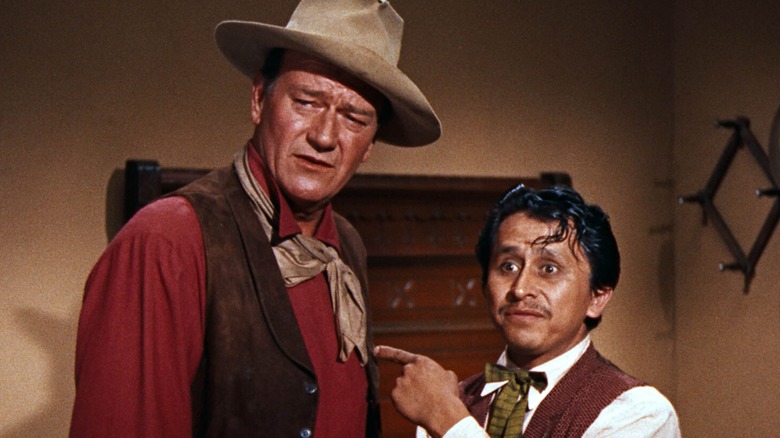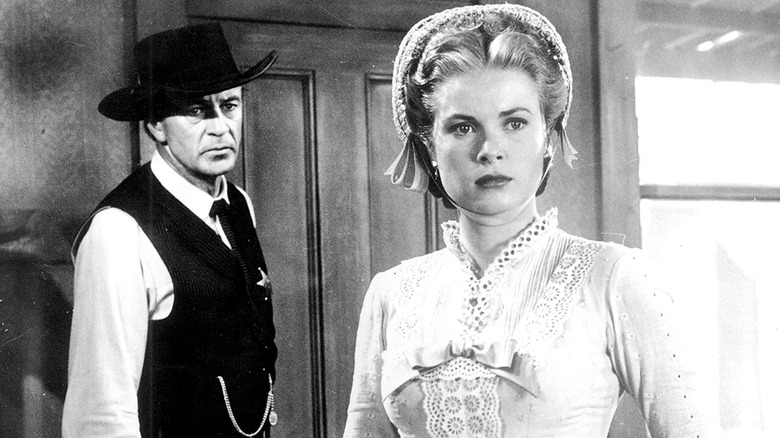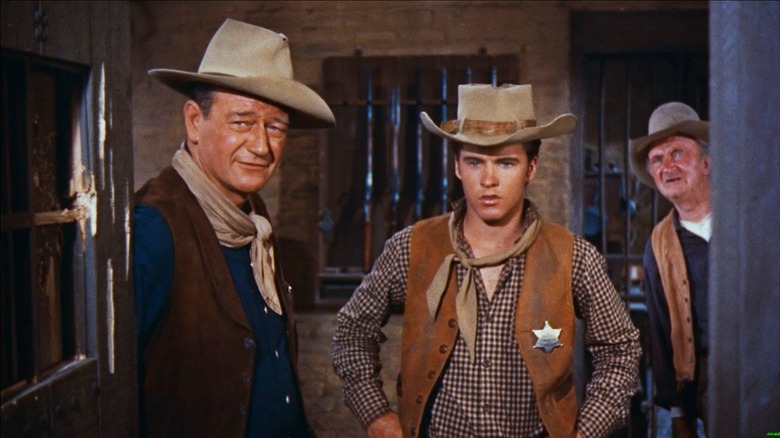Howard Hawks And John Wayne Made Rio Bravo Out Of Hatred For High Noon
A certified classic Western was born totally out of spite. "Rio Bravo" was spearheaded by two of the biggest names in Old Hollywood — the on-screen cowboy John Wayne and the multi-faceted director Howard Hawks. The 1959 film was a direct response to a Western released seven years prior, "High Noon." Hawks took issue with the characters, while Wayne had moral scruples. Their opposition to the Academy Award-winning film inspired them to make another unforgettable entry into studio era cinema.
"High Noon" stars Gary Cooper as a town marshal whose retirement plans are interrupted by a newly released convict returning to claim his revenge. When the marshal asks the townspeople for help, they all turn their backs on him. His own wife even encourages him to run away because of her pacifist Quaker beliefs, and he must face his rival alone.
The film was made in response to McCarthyism, which was rising to popularity at the time. It suggested that a strict adherence to morality and the law was caused by fear and self-preservative instincts. The screenwriter, Carl Foreman, was tried by the House Unamerican Activities Committee prior to its release and was subsequently blacklisted from Hollywood.
Wayne was offered the lead role in "High Noon" but turned it down because he found the film "un-American" (via Express). Wayne was staunchly conservative and even served as the president of the Motion Picture Alliance for the Preservation of American Ideals, an anti-communist organization. He was put off by the "High Noon" protagonist's rejection of the law. "At the end of the picture, he took the United States Marshal badge, threw it down, stepped on it and walked off," the actor recalled.
Wayne couldn't connect to the main character in High Noon
Wayne's problems with "High Noon" weren't just political — he also didn't find the story believable. "A whole city of people that have come across the plains and suffered all kinds of hardships are suddenly afraid to help out a sheriff because three men are coming into the town that are tough," he questioned. "I don't think that ever happens in the United States."
If he himself had been the town sheriff, Wayne would have handled things a little differently. "If I'd been the marshal, I would have been so goddamned disgusted with those chicken-livered yellow sons of b****** that I would have just taken my wife and saddled up and rode out of there," he told Roger Ebert.
Hawks took issue with "High Noon" because he felt it betrayed the standards of the genre. Hawks' Westerns profiled rugged men like Wayne, and the director found the protagonist of "High Noon" weak by comparison. "I didn't think a good town marshal was going to run around town like a chicken with his head cut off asking everyone to help," Hawks said (via John Wayne). "And who saves him? His Quaker wife. That isn't my idea of a good Western." It seems that the intentional genre-subversion flew over Hawks' head. Many of the director's noirs and Westerns are exemplary of their genres, hence his commitment to familiar archetypes like the noble sheriff or the femme fatale.
High Noon wasn't Hawks' idea of a good Western
The actor-director duo paired up to make "Rio Bravo" to show the creators and fans of "High Noon" what a "real Western" looked like. "A good marshal would turn around and say to someone, 'How good are you? Are you good enough to take the best man they've got?' And the fellow would say, 'No,' so the marshal would say, 'Then I'll just have to take care of you,” Hawks explained. "And that scene was in 'Rio Bravo.' It was the exact opposite of 'High Noon.'"
"Rio Bravo" was a quintessential Western, just as Hawks had intended. Wayne plays a sheriff that arrests a murderer, but the lawman runs into trouble when his brother arrives to bust him out of jail. He must enlist a rag-tag group of misfits to help him hold the brother off until reinforcements arrive, including an elderly disabled man and the town drunk. The heroes of "Rio Bravo" are noble underdogs — the opposite of the cowardly townspeople in "High Noon."
Despite his misgivings about the film, Wayne remained friendly with Cooper. He even accepted Cooper's 1953 Academy Award for Best Actor on his behalf. "Coop and I have been friends hunting and fishing for more years than I like to remember. He's one of the nicest fellas I know," Wayne told the Oscars crowd. He even joked about wanting the "High Noon" role for himself — likely a white lie for comedic effect.
Hawks and Wayne wanted to correct their misgivings with "High Noon" but ended up painting by the numbers and falling short of critical acclaim. "Rio Bravo" may have exemplified the Western genre, but "High Noon" revolutionized it.


